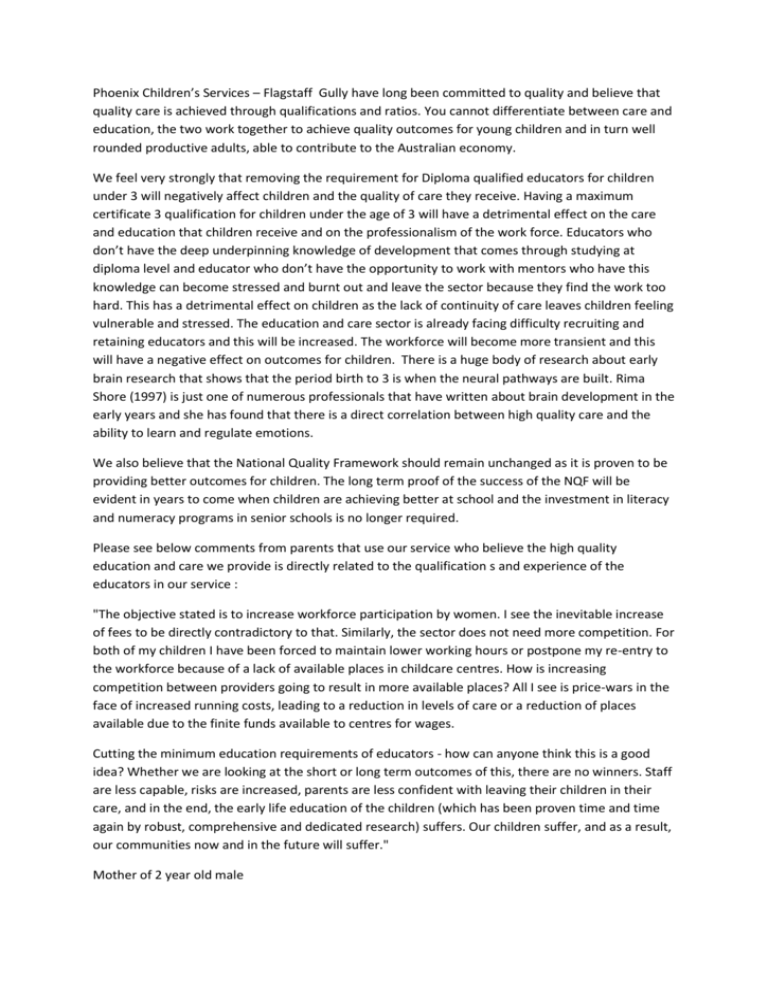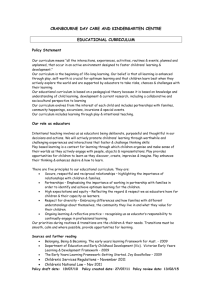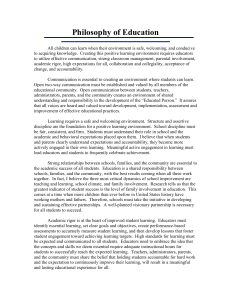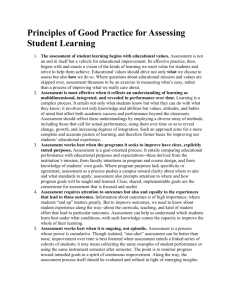Phoenix Children*s Services * Flagstaff Gully
advertisement

Phoenix Children’s Services – Flagstaff Gully have long been committed to quality and believe that quality care is achieved through qualifications and ratios. You cannot differentiate between care and education, the two work together to achieve quality outcomes for young children and in turn well rounded productive adults, able to contribute to the Australian economy. We feel very strongly that removing the requirement for Diploma qualified educators for children under 3 will negatively affect children and the quality of care they receive. Having a maximum certificate 3 qualification for children under the age of 3 will have a detrimental effect on the care and education that children receive and on the professionalism of the work force. Educators who don’t have the deep underpinning knowledge of development that comes through studying at diploma level and educator who don’t have the opportunity to work with mentors who have this knowledge can become stressed and burnt out and leave the sector because they find the work too hard. This has a detrimental effect on children as the lack of continuity of care leaves children feeling vulnerable and stressed. The education and care sector is already facing difficulty recruiting and retaining educators and this will be increased. The workforce will become more transient and this will have a negative effect on outcomes for children. There is a huge body of research about early brain research that shows that the period birth to 3 is when the neural pathways are built. Rima Shore (1997) is just one of numerous professionals that have written about brain development in the early years and she has found that there is a direct correlation between high quality care and the ability to learn and regulate emotions. We also believe that the National Quality Framework should remain unchanged as it is proven to be providing better outcomes for children. The long term proof of the success of the NQF will be evident in years to come when children are achieving better at school and the investment in literacy and numeracy programs in senior schools is no longer required. Please see below comments from parents that use our service who believe the high quality education and care we provide is directly related to the qualification s and experience of the educators in our service : "The objective stated is to increase workforce participation by women. I see the inevitable increase of fees to be directly contradictory to that. Similarly, the sector does not need more competition. For both of my children I have been forced to maintain lower working hours or postpone my re-entry to the workforce because of a lack of available places in childcare centres. How is increasing competition between providers going to result in more available places? All I see is price-wars in the face of increased running costs, leading to a reduction in levels of care or a reduction of places available due to the finite funds available to centres for wages. Cutting the minimum education requirements of educators - how can anyone think this is a good idea? Whether we are looking at the short or long term outcomes of this, there are no winners. Staff are less capable, risks are increased, parents are less confident with leaving their children in their care, and in the end, the early life education of the children (which has been proven time and time again by robust, comprehensive and dedicated research) suffers. Our children suffer, and as a result, our communities now and in the future will suffer." Mother of 2 year old male As a mother of two girls under 5yrs of age enrolled in a small, not-for-profit day care centre, I wish to express my concerns around some of the recommendations from the Productivity Commission Inquiry into Early Childhood Education and Care. Both my girls have benefited from the structured, educational programs and activities offered by those who have undergone diploma qualifications. I have witnessed firsthand the growth in confidence and the quality of care from at least three of my daughters’ educators as they have completed their diploma’s. As a teacher with over 20 years of experience in the classroom, I would argue that by reducing the educational component of educators required for birth to 3year old educators it is quite simply counterproductive to the proven and ongoing research that the early years are the most important in terms of brain development. Children who present at Kindergarten who have been exposed to quality, early care are more likely to succeed in most areas of the Australian Curriculum. To say that educators in childcares are there simply to provide care is not only an insult to us, as parents, it contradicts the emphasis from the Tasmanian Government for ensuring that children in all early years settings experience quality teaching and learning (through the Early Years Framework). Secondly, I take issue with the recommendation that the ratio be calculated across the week. Reducing the qualifications of educators and then increasing the size of care groupings is absolutely ridiculous. Mother of 2 and 4 year old females Thank you for taking the time to consider our submission and please we urge you to seriously rethink the removal of the requirement for educators caring for children under the age of 3 to hold a diploma qualification as it will have a detrimental effect on children and the sector. The investment now will have long term savings in the future. Shore, R. Rethinking the Brain: New insights into Early Development (NY: Families and Work Institute 1997)




